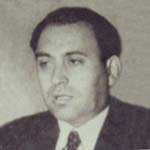Bernardo Ibáñez
Bernardo Ibáñez Águila | |
|---|---|
 | |
| Born | July 12, 1902 |
| Died | August 19, 1983 (aged 81) |
Bernardo Ibáñez Águila (July 12, 1902 in Antuco, Chile – August 19, 1983 in Santiago, Chile) was a Chilean schoolteacher and political figure. He was the Socialist candidate in Chile's 1946 presidential election.[1][2]
Ibáñez was union leader at the Confederation of Workers of Chile (Spanish: Confederación de Trabajadores de Chile, or CTCH). In 1941, he was elected as deputy for Valparaíso and Quillota.[3] In 1946, he was proclaimed presidential candidate by the Socialist Party and only got 2.53% of votes, because many socialists supported to the radical candidate Gabriel González Videla. He belonged to the anti-communist faction of the Socialist Party.[4]
Biography
[edit]Ibáñez taught in Antuco Primary School and Victoria Normal School. As a Teachers' union leader and member of the General Association of Teachers (AGP), becoming Secretary General of it.[5] He was instrumental in the creation of the General Association of Teachers by leading a group of teachers in separating from the PGA. Finally participates in the creation of the Union of Teachers of Chile in 1935.[6]
The representative of normal school teachers in the Confederation of Chilean Workers (Confederación de Trabajadores de Chile) (CTCH). Elected the Secretary General in the CTCH during the First National Congress of Chile (I Congreso Naciona de Chile) in 1939.[7] He led the Socialist faction of CTCH 1946-1953,[8] until the dividing of this union. Subsequent to the creation of the Central Unica de Trabajadores (CUT), to which both factions merged into the CTCH.[9][10]
His international connections remained with the American Confederation of Workers (Confederación Interamericana de Trabajadores) (CIT). The group would make Ibáñez its first president in 1948 and in 1951,[11] the group then became affiliated with the American Regional Organization of Workers (Organización Regional Interamericana de Trabajadores) (ORIT) founding this in 1951.
Ibáñez was a founding member of Chile's modern Socialist Party (Partido Socialista de Chile) (PS). This party is the current anticommunist-PS which was formed in 1944, in supported of President Gabriel Gonzalez Videla. He was the Secretary General of the PS between 1944-1946.[12]
Ibáñez was elected deputy for 6th Departmental district of Valparaiso and Quillota. between the years of 1941-1945. Ibáñez was the PS presidential candidate for the 1946 election, but on gained 12,114 votes (2.53%).[12][13][14][15]
See also
[edit]References
[edit]- ^ "Pan American personality parade, Volume 1". 1952. Retrieved September 18, 2016.
- ^ "Régimen de gobierno y partidos políticos en Chile 1924-1973". Editorial Jurídica de Chile. 1986. p. 293. Retrieved September 18, 2016.
- ^ "Reseña Biográfica Parlamentaria" (in Spanish). BCN. Retrieved August 15, 2013.
- ^ "AUGE COMUNISTA, DISPERSIÓN SOCIALISTA" (in Spanish). Socialismo Chileno. June 14, 2010. Retrieved August 15, 2013.[permanent dead link]
- ^ Chile Since Independence. Cambridge University Press. 1993. p. 118. ISBN 0521433754. Retrieved September 18, 2016.
- ^ Bizzarro, Salvatore (2005). Historical Dictionary of Chile. Scarecrow Press. p. 359. ISBN 0810865424. Retrieved September 18, 2016.
- ^ "International Conciliation, Issues 370-379". 1939. Retrieved September 18, 2016.
- ^ "Minutes of the ... Session of the Governing Body, Volume 123". The Office. 1953. Retrieved September 18, 2016.
- ^ "Labor Information Bulletin, Volumes 15-17". U.S. Government Printing Office. 1948. Retrieved September 18, 2016.
- ^ "Record of Proceedings, Issue 4". International Labour Office. 1949. Retrieved September 18, 2016.
- ^ "Industry and Labour, Volume 4". International Labour Office. 1950. Retrieved September 18, 2016.
- ^ a b Nohlen, Dieter (2005). Elections in the Americas: A Data Handbook: Volume 2 South America. Oxford University Press. p. 286. ISBN 0199283583. Retrieved September 18, 2016.
- ^ Gomien Díaz, Eduardo (1997). Análisis de cifras de elecciones presidenciales en Chile desde 1920 al año 1993. Concepción: revista de Derecho N°201, Universidad de Concepción.
- ^ Urzúa Valenzuela, Germán (1992). Historia política de Chile y su evolución electoral desde 1810 a 1992. Santiago: Editorial Jurídica de Chile. p. 541.
- ^ Urzúa Valenzuela, Germán (1992). Historia política de Chile y su evolución electoral: desde 1810 a 1992. Editorial Jurídica de Chile. p. 540. ISBN 9789561009578. Retrieved September 18, 2016.
